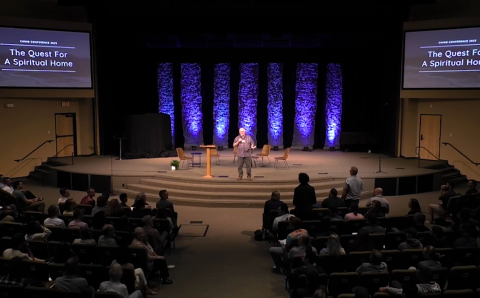I am still wrestling with the parable of the Good Samaritan. The Holy Spirit has prompted me to dwell on this passage. I brought it up in my previous editorial (“Is Love a Salvation Matter?”, Sept. 2023) which generated some interesting reactions from readers, and it might not even be the last time I dig into this Scripture. A common concern was whether I was suggesting a theology of salvation by works of love.
I believe that our salvation comes through God’s grace alone and that we are justified by faith in Christ alone. Christ’s teaching in the parable of the Good Samaritan, however, challenges my formerly neat theological categories of how faith, love, and salvation are supposed to work in relation to each other. I used a question as the September editorial’s title because I am not completely sure about my exegetical conclusions. As in many of my editorials, I offered an honest exploration from a fellow struggling Christ follower, not an authoritative word from on high. I do not pretend to have the last word on any matter I write about. But I do believe in offering what the Holy Spirit has placed on my heart and has graciously helped me to discover.
I am trying to read Scripture on its own terms and, to take my own advice from another editorial, not domesticate Scripture to fit in my theological comfort zones (“Signs of Domesticating Scripture,” Nov. 2021). I could easily have read the parable through my own theological lenses and have predetermined conclusions. But I am choosing to honestly wrestle with the passage, laying aside preconceived notions and seeing what the text is saying in its own historical and cultural context.
As much as we talk about “saving faith,” might Jesus also have a concept of “saving love”? And because the Holy Spirit is the ultimate source of both (Gal. 5:22-23), is it so hard to conceive that the two are intertwined? The late Reformed theologian R.C. Sproul once wrote, “Faith without love is not faith, only speculation or knowledge or mere intellectual assent. The fruit of authentic faith is always love” (The Purpose of God, 1994, p. 37). Most of us are more comfortable with the language of love as the fruit of faith. Faith comes first. That fits better in our neat theological system. But what if it’s messier than that?
Some letter-writers to the editor grasped the interconnectedness of faith and love. One affirmed that love is indeed a salvation matter, citing James 2:26: “Faith without deeds (of love) is dead.” (See also Justin Bailey’s Big Question on faith on p. XX.)
I think it is important to ask if love is a salvation matter, even if only to remind us of Sproul’s warning that faith without love is not genuine faith. We Reformed folks in practice act and react as if believing rightly, which often gets reduced to intellectually holding correct doctrines, is a salvation matter. Maybe the Holy Spirit placed that question on my heart as a corrective nudge for me and for us. We have too often elevated the intellectual parts of faith to the detriment of its other parts. Let’s try to find a biblical balance to our spiritual lives.
About the Author
Shiao Chong is editor-in-chief of The Banner. He attends Fellowship Christian Reformed Church in Toronto, Ont.
Shiao Chong es el redactor jefe de The Banner. El asiste a Iglesia Comunidad Cristiana Reformada en Toronto, Ont.
시아오 총은 더 배너 (The Banner)의 편집장이다. 온타리오 주 토론토의 펠로우쉽 CRC에 출석한다.
You can follow him @shiaochong (Twitter) and @3dchristianity (Facebook).









